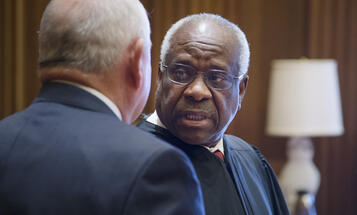
Buckley v. Valeo: The Crucial Supreme Court Case We Hear Too Little About
Buckley gave us the dubious principle that unlimited spending on elections is a form of “free speech.”
As the 2016 presidential campaign begins in earnest, we’re all bracing ourselves for the barrage of political ads coming our way.
The empty slogans and out-of-context attacks are bad enough. Worse, most of the ads—and whole campaigns—are paid for by a tiny “donor class.” This is dangerous for our country. After all, “he who pays the piper calls the tune.”
Yesterday marked the 6th anniversary of Citizens United, the infamous Supreme Court case that gave us Super PACs, direct corporate spending in elections, and hundreds of millions of dollars of secret money.
Citizens United is a big reason that just 158 families are funding about half of the current presidential campaign, and that it sometimes seems as though our democracy has descended into a shouting match between billionaires.
But, Citizens United is not the only reason big money forms such a barrier between ordinary Americans and a government that reflects our diverse population and truly represents our priorities.
Saturday, January 30th is the 40th anniversary of a less well-known but even more important money in politics Supreme Court case: Buckley v. Valeo.
Buckley addressed Congress’ post-Watergate reforms. The decision gave us the dubious principle that unlimited spending on elections is a form of “free speech.” It’s the reason that the richest among us can spend unlimited funds from their own pockets to elect their candidates of choice; billionaire candidates can bankroll their own campaigns; and Congress, states, and cities can’t cap campaign spending.
Buckley also announced a blanket rule that We the People may not limit campaign contributions or spending for the purpose of leveling the playing field between wealthy donors and ordinary Americans. In other words, while “one person, one vote” is a core principle in American democracy, this principle cannot be applied to limit big money. This flawed concept—perhaps as much as any single Supreme Court ruling—has led to a legacy of political, economic, and racial inequality that persists today.
Overturning Citizens United is a worthy goal. But it’s just the first step. Our goal cannot be to return to the glory days of 2009, when the one percent still controlled who ran for office, who won elections, and what issues made it onto the agendas in Washington and state capitols across the country.
Real solutions require the Supreme Court to transform its entire approach to the issue of money in politics and to revisit Buckley, the decision many call campaign finance law’s “original sin.”
As we mark the 6th anniversary of Citizens United and approach the 40th anniversary of Buckley let’s keep focused on our ultimate goal: building an America where the strength of our voices doesn’t depend upon the size of our wallets. To reach this goal, we need to keep Buckley—not just Citizens United—squarely in our sights.


